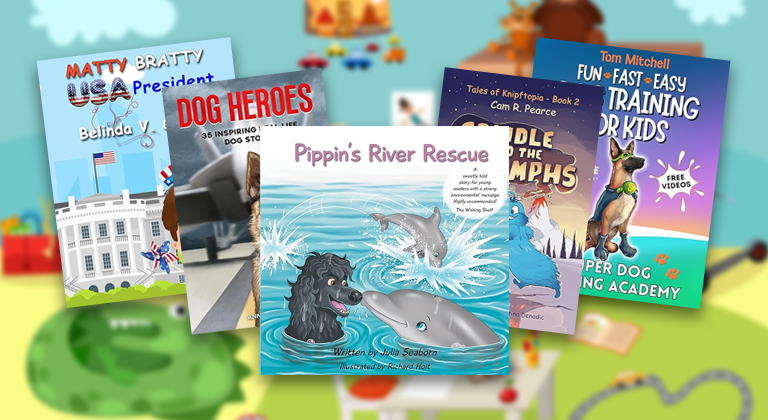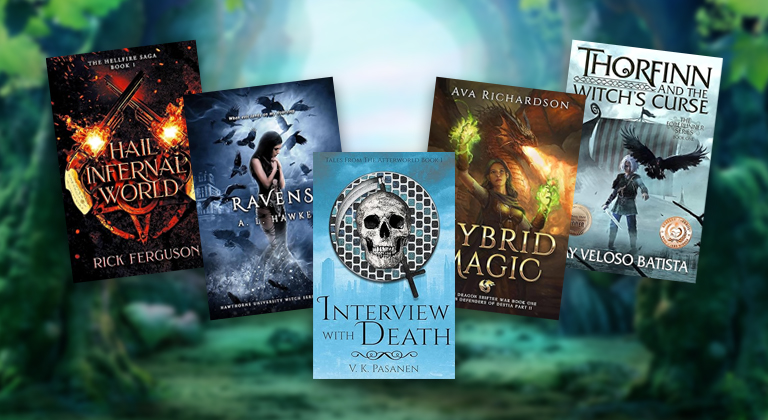Self-published authors write the way to a better tomorrow
As self-publishing has become more accessible to everyday people, traditional publishers have seen their dominance and control over the industry start to fade. Aside from giving authors more control over their careers, this shift has also led to a significant transformation within the fiction landscape, enabling a wider range of voices to share their stories. As more people are given an opportunity to express themselves, we’re seeing the emergence of fresh ideas and sub-genres that are adding depth and variety to the literary world.
As Ginger explains below, self-publishing has not only turned writing into a viable option for more of us, it has resulted in a dynamic arena for creators in general. Freed from the constraints of risk-adverse publishers who often prioritize profits over content, independent authors are making an impact, reaching broader audiences, and contributing to a more inclusive literary future.
Some self-published authors are in it for the money. Some are in it for the fame. Most just want to tell a story and let it reach an audience larger than themselves.
But some are in it for a less noble reason.
Spite.
I say that because there have definitely been times I’ve stuck at this self-publishing business purely out of spite.
Spite against all the people who’d ever doubted me. Spite against all the people who told me I’d never succeed.
Sometimes, when I was really up against it, I only stuck it out to prove them wrong – and, by God, I have!
Every milestone I’ve ever hit in my writing career has been like a big, fat, middle finger to all the people who ever doubted me.
Didn’t think I’d ever find a traditional publisher?
Boom! Turns out I didn’t need to.
Didn’t think I’d ever write books that people wanted to buy?
Boom! I’ve sold 69,000 copies of my books now – plus, I’ve reached over 320,000 readers on Kindle Unlimited, and had my books downloaded more than 600,000 times. That’s 27 times more people than live in the sleepy rural town I went to school in!
And as for those who didn’t think I’d actually be able to support my family doing this?
Well, maybe you’ve got a point with that one – but I’ll tell you this: I’ve still made over $300,000 in royalties from my self-published books, which is more than a house is worth in some parts of America.
So, I’ve proved the doubters wrong – and, more importantly than that, I’ve proved myself right.
That, in itself, is perhaps more rewarding than all the money I’ve ever made from writing.
(Okay, maybe I wouldn’t go that far.)
But here’s the thing:
I’m not even that good at what I do!
Sure, I’ve achieved a level of success in self-publishing that many authors would aspire to. I’ve made a literally life-changing amount of money from self-publishing my books, and I know that’s true because it did actually change my life.
But I couldn’t tell you how many self-published authors I’ve done consultation calls with (or helped with their book blurbs or cover design) who have achieved so much more than I have – and deserved every part of it!
I’ve worked with authors who’ve sold hundreds of thousands of copies of their books. Authors who’ve had their books optioned for movies or TV shows. Authors who’ve been able to travel the country and do incredible things as a result of their self-published books.
So many self-published authors focus on the bad parts of self-publishing. The fact that it’s a tough business to break into. The statistics that prove the majority of authors don’t make much money, and some never have their books read by anybody.
But I prefer to look at the bright side – because while all that depressing stuff about self-publishing might be true, do you know what else is true?
Since Amazon launched the business of self-publishing, more authors have been able to find success with their books than ever before!
And I mean, like, ever before. Ever before in human history, in fact!
Amazon admits that only 1,000 self-published authors make over $100,000 a year from their books – but that’s still a thousand of them! How many traditionally published authors actually make more than $100,000 a year from writing? Probably less than that number!
And that list of a thousand authors doesn’t include the thousands who nearly make $100,000 a year from self-publishing their books – or the tens of thousands who make enough to pay for a vacation every year.
There are tens of thousands more who might only make enough to pay for the occasional Starbucks coffee, but that’s still more than they’d have ever earned with their writing otherwise!
There’s no question: If you’re a human being with a desire to tell stories then there has never been a better time to be alive than right now.
And, in many ways, it’s just continuing to get better and better.
Because the influence self-publishing has had isn’t just in the number of books sold, or the millions of dollars that have gone into the pockets of hard-working writers, rather than fat-cat traditional publishers.
It’s the fact that every book self-published authors write is an act of rebellion. They’re unleashing something into the world that might never have existed if it wasn’t for self-publishing – and disrupting the entire publishing industry as they do so.
Self-publishing has led to the creation of massively popular sub-genres of fiction that simply didn’t exist beforehand, and gives a voice to writers who would have faced instant rejection from traditional publishers before. Ever since the Kindle was launched, self-published authors have been pushing the envelope of what types of fiction can be successful; and I believe that’s having a knock-on effect across modern society.
I think the romance genre is the best place to see the impact of this. As a romance author, I voraciously read romance novels, and over the past decade it’s been incredible to see how many new niches and sub-genres have exploded in popularity.
One of my favorite romance writers is Jamila Jasper, for example. She writes a sub-genre of romance known as BWWM – or “black woman/white male.” These aren’t just romance stories in which a black heroine and a white man fall for each other. They normally take place against the backdrop of racial tension, which ramps up the conflict and tension of these stories, and makes their “happily ever after” so much more satisfying and cathartic.
Today, BWWM is a massively popular sub-genre of romance – and the astonishing thing is that it barely existed at all before self-publishing! Back in the days of traditional publishing, the idea of writing a romance novel with a black heroine and a white hero would have almost certainly earned a rejection slip with some comment about the book not being “commercially viable.”
But not only is the concept commercially viable – it’s massively viable, with thousands of readers eager to delve into stories that they didn’t have the chance to before self-publishing became a thing.
The same can be said for MM fiction – which is gay romance (MM stands for male/male.) While novels about gay relationships did get published in the tradpub system, they generally weren’t “romance” books with a traditional happily-ever-after. Today, though, MM romance is a huge sub-genre supported by hundreds of thousands of readers eager to devour novels that are just as formulaic/escapist/heartwarming/entertaining (pick your adjective) as traditional romance novels (the ones centering on a woman and a man falling in love.)
Self-published authors have used platforms like Kindle Direct Publishing to make a flourishing market for ideas that traditional publishing once rejected as “not commercially viable” and in doing so, they’ve brought non-traditional relationships into the mainstream. I don’t even think it’s ridiculous to suggest that these self-published books played their own part in society becoming more accepting as a whole. Think about how people treat same-sex relationships today, as opposed to twenty years ago. Did the millions of self-published MM romance books sold in the last decade or so have a part to play in that?
Whether or not you believe that theory, one thing is true: Self-publishing has provided a platform for ideas, concepts, relationships, and voices that were rarely heard in the days of traditional publishing; and I think society has improved as a result.
And I think that improvement will continue. As long as self-publishing allows for such diversity of storytelling, voices who never had an opportunity to be heard before can find an audience; and I think the world is going to become better as a result.
Do you think there’s some weight to this theory? Have you self-published books because a traditional publisher rejected them? How has self-publishing changed your life? And in what ways do you think self-publishing as an industry has changed society? I’d love to know your thoughts, so don’t be shy about leaving them in a comment below.












It is still a big fish eats little fish world. Just a wee bit more merciful.
The one who has money buys lots of ads, review services, editorial reviews, etc. and earns a lot even if they are mediocre (or even bad). The one who doesn’t gets brushed over because they don’t get enough exposition, even if they are awesome.
In the genre I write in, only two authors hog the Amazon ads.
I agree. Publishing needed to evolve. And it will probably always evolve, because that’s the nature of the world. I for one love that a handful of jaded MFA’s no longer get to decide what’s commercially viable or entertaining. But I also love seeing select publishers look to the Indie world for their next authors instead of their slush pile or what an agent is pushing. For example, I think Entangled Publishing just signed 10 new Indie authors. And because those authors were established, they were able to negotiate good contract terms. I believe most retained eBook rights and only sold paper. It’s a win-win scenario for trad and Indie. Trad takes less risk by investing in authors the marketplace already supports, the authors get better contracts and get to leverage trad for what they are really good at…distribution. And Indie gains a stronger foothold and respect as a “commercially viable” path. And readers are served with variety and choice.